A Vineyard business tradition of nearly 10 years and a family tradition reaching back to Eastern Europe and the last century will end in January with the sale of Cronig’s State Road Market to an off-Island resident.
Robert Cronig, a son of Cronig’s Market founder Samuel Cronig and overseer of expansion of the family business to State Road in the mid-1970s, will sell the market to Steven Bernier, a former Star Market manager from Andover, Mass., early in 1986. The sale was announced this week by Cronig’s vice president Nancy Cronig Morris, who said the same staff will remain working at the well-known supermarket.
“The transaction is between Mr. Bernier and Cronig’s Market, and does not involve Star Market in any way,” Mrs. Morris said. She added: “Mr. Bernier is managing the market until he becomes the owner. The real estate is to be retained by the present owners, Robert Cronig, Nancy Morris and Judith Barnes.”
For Mrs. Morris and for many members of the Cronig clan whose forebears - Samuel Cronig and his three brothers - settled on the Vineyard early in this century, the Jan. 10 sale to Steven Bernier will bring the end of an era.
“It’ll be wrenching in some ways, but exciting, too,” said Mrs. Morris. “I’ve worked here off and on since I was a child. We were raised in the business.”
So were the children and many other grandchildren of Samuel Cronig and his brothers. Samuel Cronig, considered the first permanent Jewish settler on the Vineyard, came to the Island in 1905 from Lithuania — now a part of the Soviet Union — via New York city. He worked on an Eastville farm and later at the former grocery stores Look, Washburn and Co., and Bodfish and Call, for more than a decade. His brothers followed him here and in 1917 they established Cronig Brothers Market on Main street in Vineyard Haven.
The Cronig brothers were in business for seven years when their parents, Mr. and Mrs. Morris Cronig, came to the Island from Lithuania to see their sons in 1924. The visit made front-page news in the Vineyard Gazette, with the elder Cronigs comparing the peace and prosperity in their children’s adopted homeland with the hardships and poverty that went with being Jewish in Eastern Europe during that time:
“Mr. Cronig conducts a grocery store in his native town, a small establishment carrying only staples. Canned goods are unknown there and he had never seen any until he entered the Vineyard store of his son . . . Mr. Cronig is a very alert man and anxious to learn things about this country. But everything is so strange to him and he sees such evidence of what he considers wealth on every side that he is much bewildered and puzzled.
“Comparing values in this country and Lithuania, he first figured the value of the most common coin that takes the place of our dollar. It is worth about 10 cents in American money. From this basis he spoke of prices in general. His little grocery store took in, he said, an average of $12 weekly and was considered to be a thriving establishment.”
By this time the sons and grandchildren of Morris Cronig were thriving in business, and they would continue to do so while conditions worsened in the old country. On the occasion of Samuel Cronig’s 25th year in business, the Gazette reported, “Tomorrow he will observe his first quarter-century as a proprietor of a New England market and grocery, a far cry from the birthplace that he knew, where today armies are battling. Many men have made a greater financial success of life, but in this little Island Sam Cronig has built for himself a reputation second to none anywhere.”
Besides establishing a business reputation, Samuel Cronig and his brothers established a family foothold; Cronig descendants are heavily involved in the civic and cultural life of Vineyard Haven and the Island. The history of the Martha’s Vineyard Hebrew Center, founded in 1940, is dotted with Cronig family members, and Samuel Cronig’s daughter Anne is center president today.
In 1956, Samuel Cronig handed day-to-day management of the Main street store to his sons Robert and S. David Cronig, who expanded the operation several times. Twenty years later they moved to the current State Road site, but maintained the Main street site. Finally, in 1980, David Cronig left the business and the Main street store was sold to Bruce Levett.
Robert Cronig and his daughters ran the State Road market after that. Last year Mr. Cronig’s wife died, and his health has been up and down. So Nancy Morris and Judith Barnes finally decided to get on with their own lives, but not without a strong sense of nostalgia.
“It has been hard work,” Nancy Morris said on Tuesday, “but it was always ours.
“It will be a big change.”






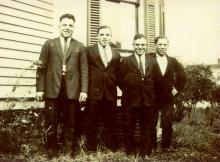
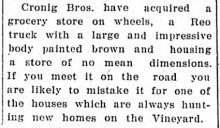
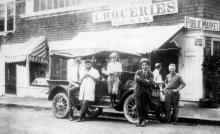
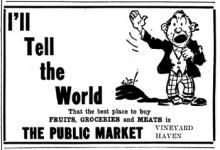
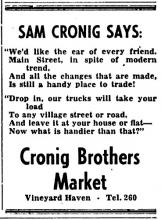
Comments